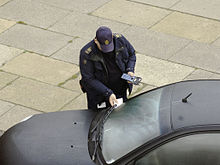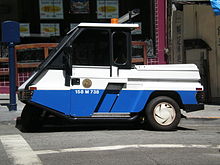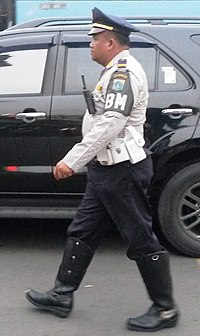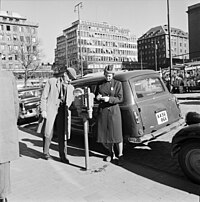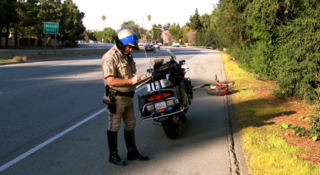
A highway patrol is a police unit, detail, or law enforcement agency created primarily for the purpose of overseeing and enforcing traffic safety compliance on roads and highways within a jurisdiction. They are also referred to in many countries as traffic police, although in other countries this term is more commonly used to refer to foot officers on point duty who control traffic at junctions.
A Police Community Support Officer, or as written in legislation Community Support Officer, is a uniformed member of police staff in England and Wales, a role created by Section 38(2) of the Police Reform Act 2002, which was given Royal Assent by Queen Elizabeth II on 24 July 2002. They are not warranted, but hold a variety of police powers and the power of a constable in various instances by the forty-three territorial police forces in England and Wales and the British Transport Police.

A wheel clamp, also known as wheel boot, parking boot, or Denver boot, is a device that is designed to prevent motor vehicles from being moved. In its most common form, it consists of a clamp that surrounds a vehicle wheel, designed to prevent removal of both itself and the wheel.

A traffic ticket is a notice issued by a law enforcement official to a motorist or other road user, indicating that the user has violated traffic laws. Traffic tickets generally come in two forms, citing a moving violation, such as exceeding the speed limit, or a non-moving violation, such as a parking violation, with the ticket also being referred to as a parking citation, or parking ticket.
A crossing guard, lollipop man/lady, crosswalk attendant, or school road patrol is a traffic management personnel who is normally stationed on busy roadways to aid pedestrians. Often associated with elementary school children, crossing guards stop the flow of traffic so pedestrians may cross an intersection.

Code enforcement, sometimes encompassing law enforcement, is the act of enforcing a set of rules, principles, or laws and ensuring observance of a system of norms or customs. An authority usually enforces a civil code, a set of rules, or a body of laws and compel those subject to their authority to behave in a certain way.
Council rangers are officers employed by local government areas in Australia to enforce the by-laws of those local governments and a limited range of state laws relating to such matters as litter control, animal control, dog laws, cat laws, bush fire control, off-road vehicles, emergency management, and parking. A Council Ranger is also referred to as Local Laws Officers in some of Australia's eastern states.
In the United Kingdom, a fixed penalty notice (FPN) is a notice giving an individual the opportunity to be made immune from prosecution for an alleged criminal offence in exchange for a fee. Fixed penalty notices were introduced in Britain in the 1980s to deal with minor parking offences. Originally used by police and traffic wardens, their use has extended to other public officials and authorities, as has the range of offences for which they can be used.

The Road Traffic Regulation Act 1984 is an Act of Parliament in the United Kingdom, which provided powers to regulate or restrict traffic on UK roads, in the interest of safety. It superseded some earlier legislation, including the majority of the Road Traffic Regulation Act 1967. The Act is split into 10 parts covering 147 sections, it also includes 14 schedules.

Law enforcement in Canada is the responsibility of police services, special constabularies, and civil law enforcement agencies, which are operated by every level of government, some private and Crown corporations, and First Nations. In contrast to the United States or Mexico, and with the exception of the Unité permanente anticorruption in Quebec and the Organized Crime Agency of British Columbia, there are no organizations dedicated exclusively to the investigation of criminal activity in Canada. Criminal investigations are instead conducted by police services, which maintain specialized criminal investigation units in addition to their mandate for emergency response and general community safety.
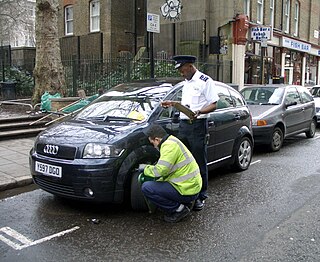
Decriminalised parking enforcement (DPE) is the name given in the United Kingdom to the civil enforcement of car parking regulations, carried out by civil enforcement officers, operating on behalf of a local authority. The Road Traffic Act 1991 (c. 40) provided for the decriminalisation of parking-related contraventions committed within controlled parking zones (CPZ) administered by local councils across the UK. The CPZs under the control of the local councils are also referred to as yellow routes and they can be easily identified with yellow lines marked on the roads with relevant time plates. Councils employ parking attendants to enforce their CPZs directly.

A parking violation is the act of parking a motor vehicle in a restricted place or in an unauthorized manner. It is against the law virtually everywhere to park a vehicle in the middle of a highway or road; parking on one or both sides of a road, however, is commonly permitted. However, restrictions apply to such parking, and may result in an offense being committed. Such offenses are usually cited by a police officer or other government official in the form of a traffic ticket.

A disabled parking permit, also known as a disabled badge, disabled placard, handicapped permit, handicapped placard, handicapped tag, and "Blue Badge" in the European Union, is a permit that is displayed upon parking a vehicle. It gives the operator of a vehicle permission to special privileges regarding the parking of that vehicle. These privileges include parking in a space reserved for persons with disabilities, or, in some situations, permission to park in a time-limited space for a longer time, or to park at a meter without payment.
The Aviation Policing Command (APC) now renamed as Aviation Security Operational Unit (SO18) is a Specialist Operations unit of London's Metropolitan Police Service. The unit is responsible for providing policing and security for both Heathrow and London City airports. London's other airports, Gatwick, Stansted and Luton are policed by Sussex, Essex, and Bedfordshire Police respectively, as they are not located in the Metropolitan Police District.

A bylaw enforcement officer is an employee of a municipality, county or regional district, charged with the enforcement of local ordinance—bylaws, laws, codes, or regulations enacted by local governments. Bylaw enforcement officers often work closely with police and other law enforcement agencies, but are generally not considered emergency services.

The municipal police are the local police of towns and cities in France. There are 24,000 municipal police officers in 4,555 communities. The municipal police are one of the three components of French policing, alongside the National Police and the National Gendarmerie, with about 145,000 police and 98,000 soldiers respectively.
A civil enforcement officer is a person employed to enforce parking, traffic and other restrictions and laws.
The British Parking Association Limited (BPA), is a British-based trade association that focuses on parking and traffic management fields. The association is a company limited by guarantee, and non-profit organisation founded in 1968, though was not registered until 1970.
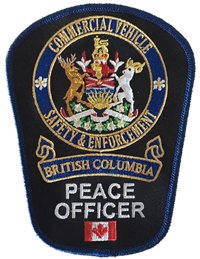
British Columbia Commercial Vehicle Safety & Enforcement is a provincial law enforcement agency that is responsible for the compliance and enforcement of the commercial transport sector, protection of the environment and transportation infrastructure of British Columbia, increasing road safety and protecting the motoring public.

The Traffic Safety Service was a division of the Ministry of Transport of New Zealand. It was a uniformed law enforcement agency responsible for enforcing road transport law in New Zealand. It was separate from the New Zealand Police.
